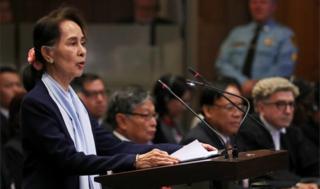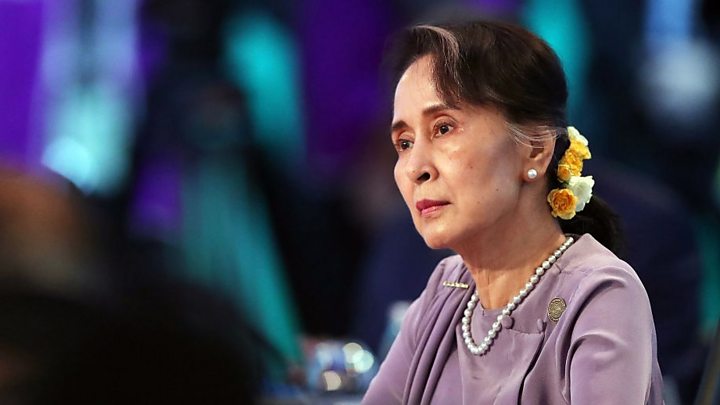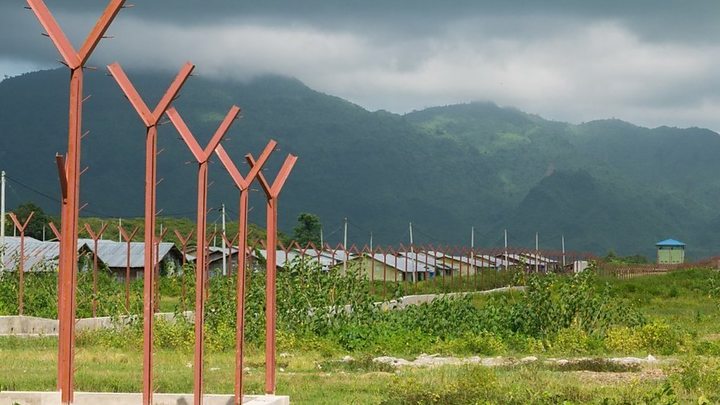 Image copyright Reuters
Image copyright Reuters Myanmar’s leader Aung San Suu Kyi has been defending her country against allegations of genocide at the UN International Court of Justice (ICJ).
The Nobel Peace Prize laureate is responding to widespread claims that Myanmar (formerly Burma) committed atrocities against Muslim Rohingya.
In her opening remarks, she called the case against Myanmar “incomplete and incorrect”.
She said troubles in Rakhine, where many Rohingya lived, go back centuries.
Thousands of Rohingya were killed and more than 700,000 fled to neighbouring Bangladesh during an army crackdown in Buddhist-majority Myanmar in 2017.
Myanmar has always insisted it was tackling an extremist threat in Rakhine state, and Ms Suu Kyi maintained that stance, calling the violence an “internal armed conflict triggered by attacks on police posts”.
She told the court that the violence was started by militants seeking independence. She said that if war crimes were committed by Myanmar’s military “they will be prosecuted”.
Ms Suu Kyi said Myanmar was committed to the safe repatriation of people displaced from Rakhine, and urged the court to avoid any action that could aggravate the conflict.
Why is Myanmar in court now?
The ICJ is the UN’s top court, and cases must be submitted to it by countries.
This one has been brought by The Gambia, a small Muslim-majority west African nation, on behalf of dozens of other Muslim countries.
“All that The Gambia asks is that you tell Myanmar to stop these senseless killings, to stop these acts of barbarity that continue to shock our collective conscience, to stop this genocide of its own people,” The Gambia’s Attorney General and Justice Minister, Abubacarr M Tambadou, told the court.
His country acted after he visited a Rohingya refugee camp in Bangladesh and heard of killings, rape and torture, he told the BBC in October.
At the initial three-day hearing, The Gambia is asking the ICJ in The Hague to approve temporary measures to protect the Rohingya. But a final ruling on genocide may be years away.
What are the accusations?
At the start of 2017, there were one million Rohingya in Myanmar, most living in Rakhine state.
But Myanmar, a mainly Buddhist country, considers them illegal immigrants and denies them citizenship.
The Rohingya have long complained of persecution, and in 2017 the military – the Tatmadaw – launched a massive military operation in Rakhine.
According to The Gambia’s submission to the ICJ, the military stands accused of “widespread and systematic clearance operations” against the Rohingya, beginning in October 2016 and expanding in August 2017.
The Gambia’s petition alleges that the clearances were “intended to destroy the Rohingya as a group, in whole or in part”, via mass murder, rape and setting fire to their buildings “often with inhabitants locked inside”.
A UN fact-finding mission which investigated the allegations found such compelling evidence that it said the Burmese army must be investigated for genocide against Rohingya Muslims in Rakhine.
In August, a report accused Myanmar soldiers of “routinely and systematically employing rape, gang rape and other violent and forced sexual acts against women, girls, boys, men and transgender people”.
In May, seven Myanmar soldiers jailed for killing 10 Rohingya men and boys were released early from prison. Myanmar says its military operations targeted Rohingya militants, and the military has previously cleared itself of wrongdoing.
What is Aung San Suu Kyi’s role?
The case is being brought against Myanmar, not Aung San Suu Kyi.
The ICJ cannot punish individuals in the way that, for example, the International Criminal Court can (separately, the ICC is investigating the Rohingya case).
But the case is, to some extent, about the 1991 Nobel Peace Prize winner herself.
Ms Suu Kyi has been de facto leader of Myanmar since April 2016, before the alleged genocide began. She does not have control over the army but has been accused by the UN investigator of “complicity” in the military clearances.

Media playback is unsupported on your device
“I implore you to open your eyes… and please use your moral authority, before it is too late,” the investigator, Yanghee Lee, said in September.
Ms Suu Kyi confirmed in November that she would personally lead her country’s defence at The Hague – in her role as foreign affairs minister – alongside “prominent international lawyers”.
What is the likely outcome of this case?
For now, The Gambia is just asking the court to impose “provisional measures” to protect the Rohingya in Myanmar and elsewhere from further threats or violence. These will be legally binding.
To rule that Myanmar has committed genocide, the court will have to determine that the state acted “with intent to destroy in whole or in part” the Rohingya minority.
Even then the ICJ has no way of enforcing the outcome – and neither Aung San Suu Kyi nor the generals would automatically be arrested and put on trial.
But a guilty ruling could lead to sanctions, and would cause significant reputational and economic damage to Myanmar.
What is the current situation for the Rohingya?
Hundreds of thousands of Rohingya have fled Myanmar since the military operations began.

Media playback is unsupported on your device
As of 30 September, there were 915,000 Rohingya refugees in camps in Bangladesh. Almost 80% arrived between August and December 2017, and in March this year, Bangladesh said it would accept no more.
In August, Bangladesh set up a voluntary return scheme – but not a single Rohingya chose to go.
Bangladesh plans to relocate 100,000 refugees to Bhasan Char, a small island in the Bay of Bengal, but some 39 aid agencies and human rights groups have opposed the idea.
In September, the BBC’s Jonathan Head reported that police barracks, government buildings and refugee relocation camps had been built on the sites of former Rohingya villages in Myanmar.
Click Here to Visit Orignal Source of Article https://www.bbc.co.uk/news/world-asia-50741094

